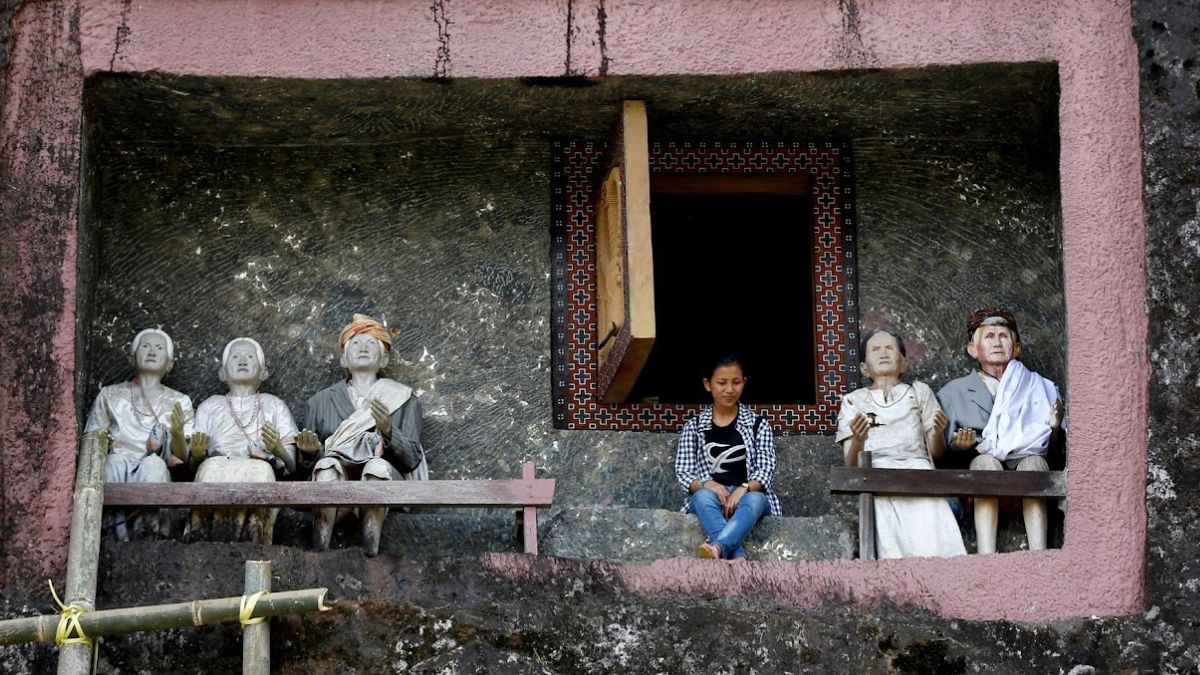- By Shivangi Sharma
- Thu, 13 Feb 2025 07:27 PM (IST)
- Source:JND
In most cultures, the deceased are either buried or cremated within days of their passing. However, the Torajan people of Indonesia practice a unique tradition that defies conventional death rituals. For them, death is not the end but a gradual process of transition to the afterlife. They keep the bodies of their deceased relatives at home for weeks, months, or even years, treating them as if they are still alive.
The Torajan people believe that their loved ones are merely “sick” rather than dead until an elaborate funeral ceremony is held. The body is kept in the family home, provided with a designated room, dressed in fresh clothes, and regularly cleaned. Family members offer food, cigarettes, and even a bowl that serves as a symbolic toilet. This practice allows the family to process their grief gradually and adjust to the separation over time. As one Torajan woman, Mamak Lisa, told the BBC, she kept her father’s body at home for 12 years. “If we buried him straight away, we would also feel the pain very suddenly,” she explained.
Extravagant Funerals And Journey To Puya
Torajan funerals are grand affairs, often taking years to prepare due to their high costs. Wealth and social status play a significant role in determining the scale of the funeral. The richer and more powerful the individual, the more extravagant the ceremony, which includes elaborate death feasts, music, and ritualistic animal sacrifices. Buffaloes, which are considered sacred, are slaughtered in large numbers, symbolizing the deceased’s journey to Puya, the land of souls.
Since death is viewed as a gradual transition, the body remains in the family home until sufficient funds are gathered to host the funeral. During this waiting period, the deceased is wrapped in multiple layers of cloth and placed under the tongkonan, a traditional ancestral house. The soul is believed to linger in the village until the funeral rites are completed, after which it begins its journey to Puya.
The Ma’nene Ritual: Honoring Ancestors
Every three years, the Torajans perform Ma’nene, a ritual in which they exhume and clean the preserved bodies of their ancestors. They dress them in fresh clothes, groom them, and even pose them for photographs. This ceremony is seen as a way of showing love and respect for their ancestors, reinforcing the deep spiritual connection between the living and the dead.
(Image credits: Reuters)
Legend Of Pong Rumasek
The Ma’nene ritual is believed to have originated from a hunter named Pong Rumasek, who, upon discovering an abandoned corpse in the forest, wrapped it in his own clothes and gave it a proper resting place. Following this act of compassion, Pong Rumasek experienced great fortune, leading the Torajan people to adopt the tradition of honouring their dead through Ma’nene.

